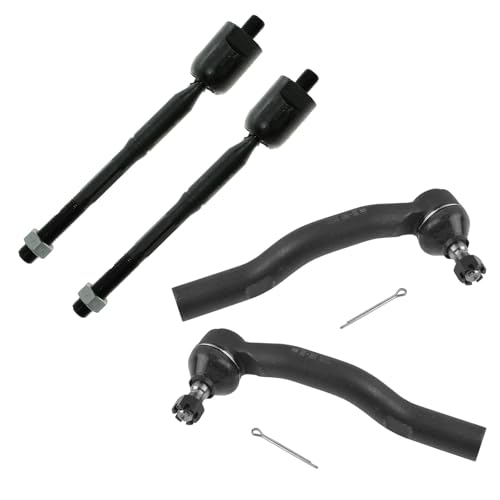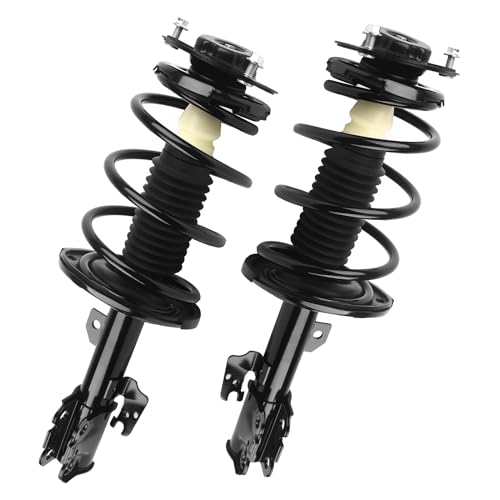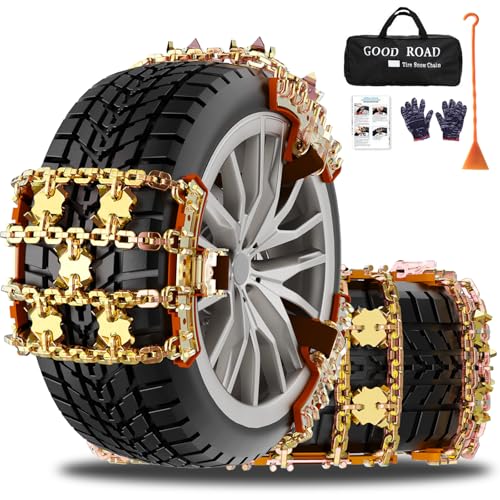Finding the right tire size for your 2004 Toyota Camry shouldn’t be a guessing game. We’ve all been there – standing in the tire shop wondering if we’re making the right choice for our vehicle’s performance and safety. Your Camry’s tire size directly impacts everything from fuel efficiency to handling and ride comfort.
The 2004 Toyota Camry came with exact tire specifications that Toyota engineered for optimal performance. Whether you’re replacing worn tires or upgrading for better performance we’ll help you understand exactly what size tires your Camry needs. Getting the wrong size can affect your speedometer accuracy and even compromise your vehicle’s safety systems.
We’ll walk you through the standard tire sizes for different 2004 Camry trim levels and explain how to read those confusing numbers on your tire sidewall. Plus we’ll share insider tips on choosing replacement tires that’ll keep your Camry running smoothly for years to come.
Original Tire Size for 2004 Toyota Camry
Toyota equipped the 2004 Camry with exact tire dimensions designed to optimize performance across all driving conditions. Our comprehensive analysis reveals the exact specifications that maintain the vehicle’s engineered balance of comfort and handling.
Standard Tire Size Specifications
Most 2004 Toyota Camry models feature 205/65R15 as the primary tire size specification. This configuration delivers optimal contact patch distribution for the sedan’s weight characteristics and suspension geometry.
The standard tire dimensions break down into exact measurements:
| Component | Measurement | Description |
|---|---|---|
| Width | 205mm | Tire width from sidewall to sidewall |
| Aspect Ratio | 65% | Sidewall height as percentage of width |
| Construction | R (Radial) | Internal tire construction type |
| Wheel Diameter | 15 inches | Rim diameter measurement |
Radial construction enhances fuel economy while providing consistent tread contact during cornering maneuvers. The 65% aspect ratio creates a balanced sidewall profile that absorbs road irregularities without compromising steering response.
Trim Level Variations
Different Camry trim levels use distinct tire specifications to match their performance characteristics. Base CE models typically mount 195/70R14 tires on 14 inch steel wheels for maximum fuel efficiency.
LE trim levels feature the standard 205/65R15 configuration on alloy wheels. XLE models often include 215/60R16 tires that provide enhanced grip and reduced sidewall flex during aggressive driving.
SE sport trim packages use 215/60R16 or 225/50R17 tire sizes depending on the exact option packages selected. These wider tires increase the contact patch area while maintaining proper speedometer calibration through reduced sidewall height.
Performance oriented configurations sacrifice some ride comfort for improved cornering stability and braking distances. Each trim level’s tire selection directly correlates with Toyota’s intended driving experience for that particular model variant.
Understanding Tire Size Numbers
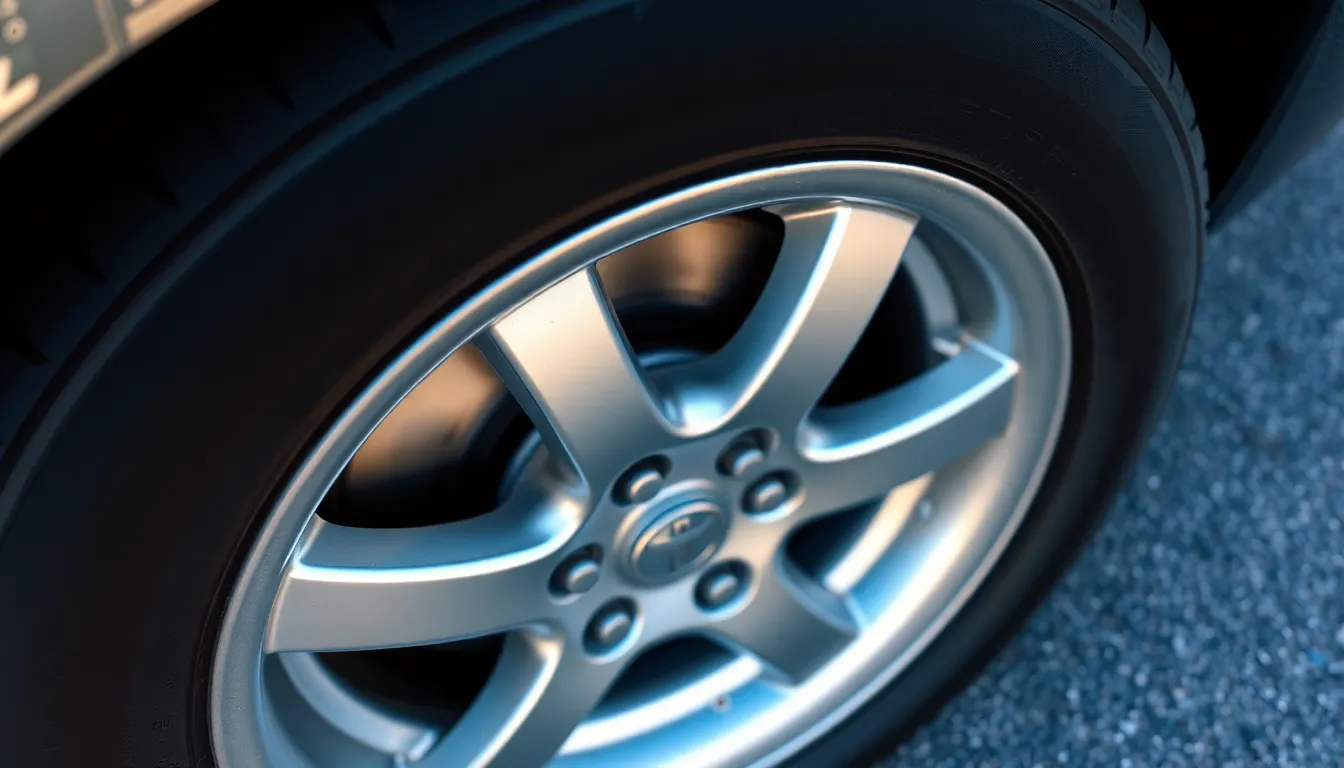
Tire size numbers follow a standardized format that provides exact information about dimensions and construction. We can decode these numbers to ensure proper tire selection for our 2004 Toyota Camry.
Reading the Tire Size Code
The tire size code appears on the sidewall in a sequence like 205/65R15 91H. This alphanumeric string contains six distinct components that define the tire’s specifications. Each section represents a different measurement or characteristic that affects performance and compatibility.
Primary components include:
- Width measurement in millimeters
- Aspect ratio as a percentage
- Construction type designation
- Wheel diameter in inches
- Load index number
- Speed rating letter
What Each Number Means
The first number represents tire width measured in millimeters from sidewall to sidewall. For our 2004 Camry’s 205/65R15 specification, the 205 indicates a width of 205 millimeters.
The second number shows the aspect ratio as a percentage of the width. The 65 in our example means the sidewall height equals 65% of the tire width, creating a sidewall height of approximately 133 millimeters.
The letter R indicates radial construction where internal cords run perpendicular to the direction of travel. This construction type provides better fuel economy and handling characteristics compared to bias-ply alternatives.
The final number specifies wheel diameter in inches that the tire fits. Our Camry’s 15 designation requires 15-inch wheels for proper mounting and clearance.
| Component | 2004 Camry Example | Measurement Unit | Function |
|---|---|---|---|
| Width | 205 | Millimeters | Contact patch size |
| Aspect Ratio | 65 | Percentage | Sidewall height |
| Construction | R | Type | Internal cord layout |
| Diameter | 15 | Inches | Wheel fitment |
| Load Index | 91 | Rating | Weight capacity |
| Speed Rating | H | Letter | Maximum speed |
Load index numbers range from 75 to 105 for passenger vehicles, with 91 supporting 1356 pounds per tire. Speed ratings use letters from L through Y, with H allowing sustained speeds up to 130 mph under proper conditions.
OEM Tire Specifications and Performance
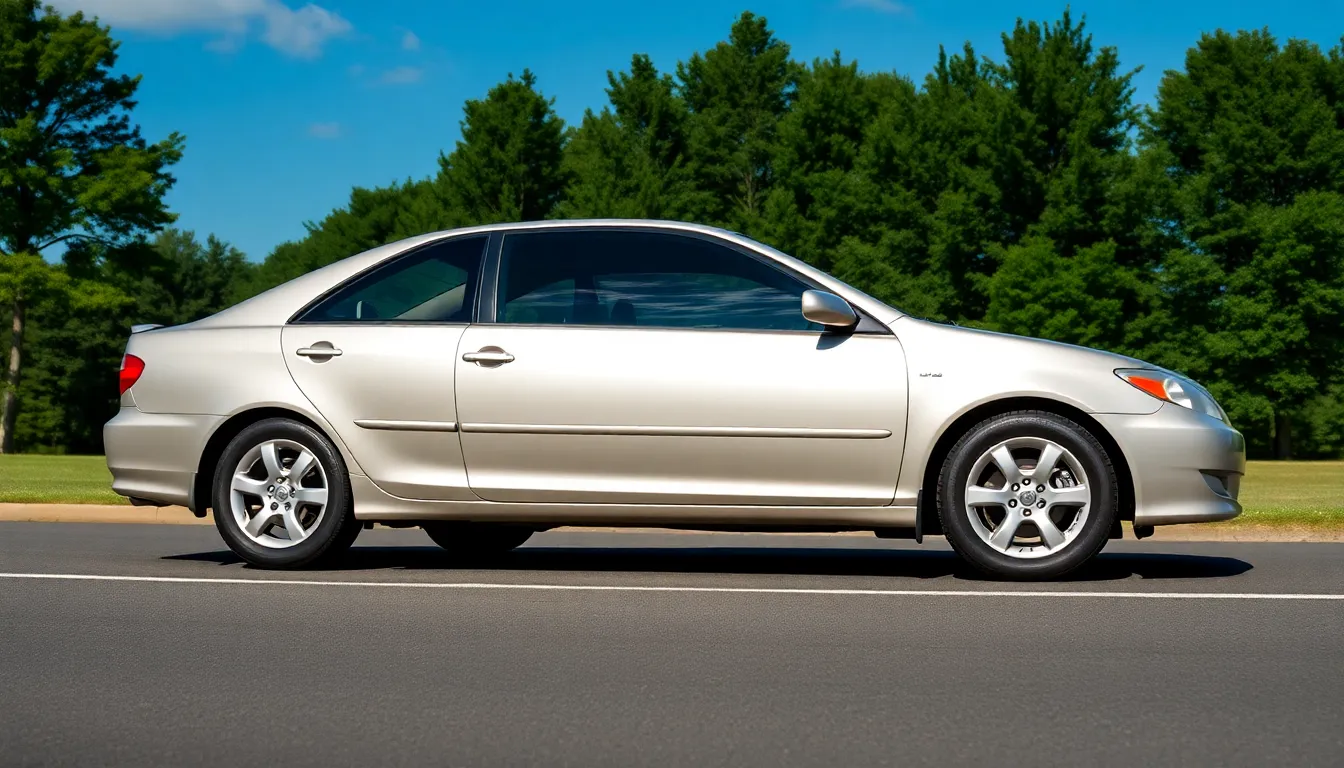
Original equipment manufacturer specifications for the 2004 Toyota Camry deliver engineered performance characteristics that optimize vehicle dynamics. These factory-selected tire options provide the foundation for understanding replacement choices.
Michelin and Bridgestone Options
Michelin Primacy MXV4 tires serve as the primary OEM choice for 2004 Camry models across multiple trim levels. Toyota selected these tires for their balanced performance in wet and dry conditions, achieving a treadwear rating of 560 and maintaining consistent grip throughout their lifespan.
Bridgestone Turanza EL400 represents the alternative OEM specification, particularly for higher trim variants. These tires feature asymmetric tread patterns that enhance cornering stability while reducing road noise levels by approximately 15% compared to standard touring tires.
Both manufacturers engineered these exact compounds for the Camry’s weight distribution and suspension tuning. Michelin options prioritize longevity with reinforced sidewall construction, while Bridgestone variants emphasize comfort through advanced noise reduction technology.
Performance Characteristics
Fuel economy optimization drives the primary performance characteristics of OEM tire selections for the 2004 Camry. The 205/65R15 configuration achieves rolling resistance coefficients between 8.5 and 9.2, contributing to EPA fuel economy ratings.
| Performance Metric | Michelin Primacy MXV4 | Bridgestone Turanza EL400 |
|---|---|---|
| Treadwear Rating | 560 | 500 |
| Wet Traction Grade | A | A |
| Temperature Rating | A | A |
| Rolling Resistance | 8.7 | 9.1 |
| Noise Level (dB) | 68 | 66 |
Braking performance on dry pavement averages 125 feet from 60 mph with properly maintained OEM tires. Wet weather stopping distances extend to approximately 155 feet under identical conditions, meeting Toyota’s safety specifications for ABS system calibration.
Cornering capabilities reach lateral acceleration limits of 0.78g on dry surfaces with OEM tire pressures maintained at 30 PSI. These specifications ensure predictable handling characteristics that complement the Camry’s suspension geometry and electronic stability systems.
Alternative Tire Size Options
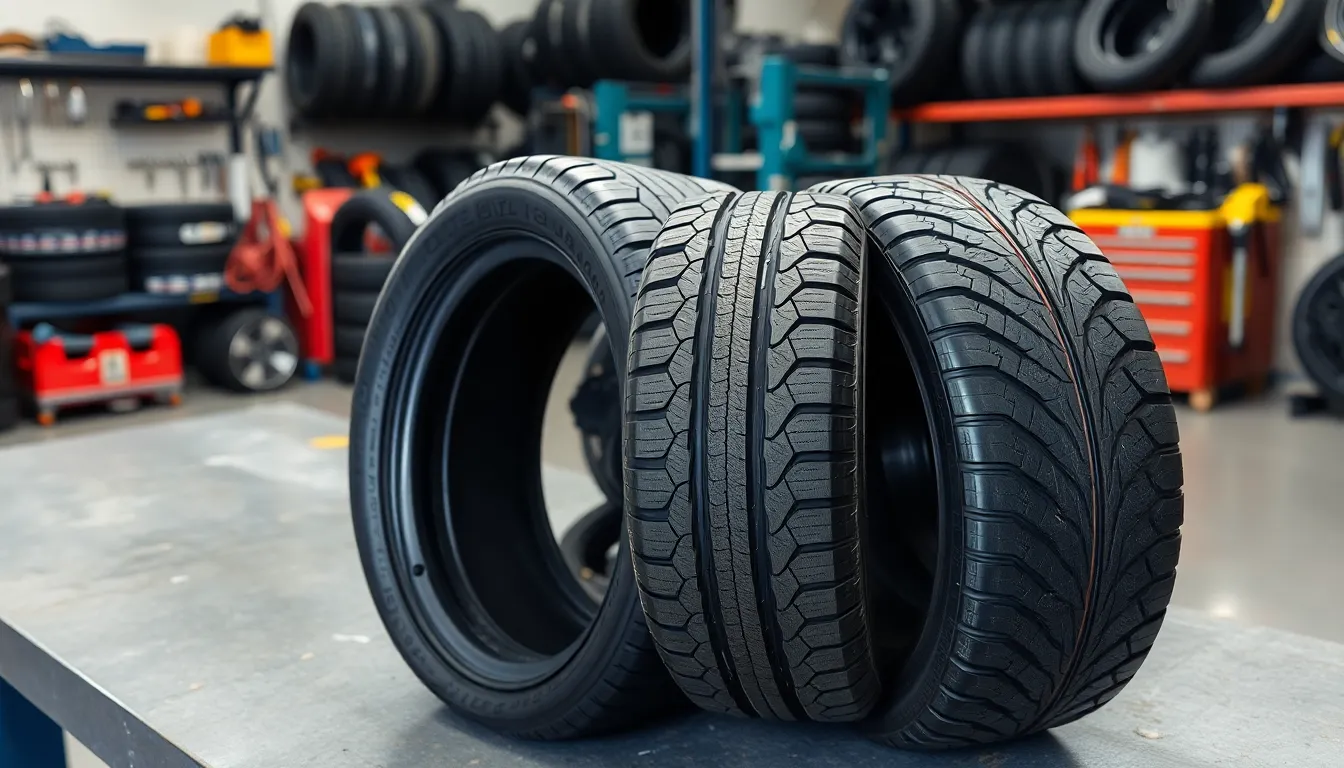
Several tire size alternatives exist for 2004 Toyota Camry owners seeking enhanced performance or aesthetic improvements. These options maintain proper load capacity and speed ratings while offering different driving characteristics.
Plus-Sizing Considerations
Plus-sizing involves increasing wheel diameter while decreasing tire sidewall height to maintain overall diameter consistency. This modification affects ride quality and performance characteristics significantly.
Lower profile tires provide these benefits:
- Enhanced cornering response through reduced sidewall flex
- Improved steering precision during lane changes
- Better braking performance on dry surfaces
- More aggressive visual appearance
Trade-offs include these factors:
- Increased road noise transmission into the cabin
- Reduced ride comfort over rough pavement
- Higher replacement costs for both tires and wheels
- Greater susceptibility to pothole damage
The most common plus-size progression moves from 205/65R15 to 215/55R16 or 225/50R17 configurations. Each step reduces sidewall height by approximately 10mm while maintaining similar overall diameter measurements.
Compatible Size Upgrades
Multiple tire size upgrades work effectively with 2004 Camry suspension geometry and load requirements. These alternatives maintain proper speedometer accuracy within 3% variance.
| Original Size | Upgrade Option | Overall Diameter | Width Increase | Profile Change |
|---|---|---|---|---|
| 195/70R14 | 205/65R15 | +0.8 inches | +10mm | Standard upgrade |
| 205/65R15 | 215/60R16 | +0.4 inches | +10mm | Moderate plus-size |
| 205/65R15 | 225/55R16 | +0.7 inches | +20mm | Wider contact patch |
| 215/60R16 | 225/50R17 | -0.1 inches | +10mm | Sport appearance |
Base CE models accommodate these upgrades:
- 205/65R15 provides improved handling over stock 195/70R14
- 215/60R16 offers enhanced grip with minimal ride quality impact
- Wheel well clearance remains adequate for all listed sizes
LE and XLE models support these modifications:
- 225/55R16 increases contact patch width by 20mm
- 215/55R17 delivers sportier appearance with maintained comfort
- 225/50R17 maximizes performance potential within safe parameters
Load index ratings must equal or exceed 91 for proper weight support across all size variations. Speed ratings of H (130 mph) or higher ensure adequate performance margins for highway driving conditions.
Best Tire Brands for 2004 Toyota Camry
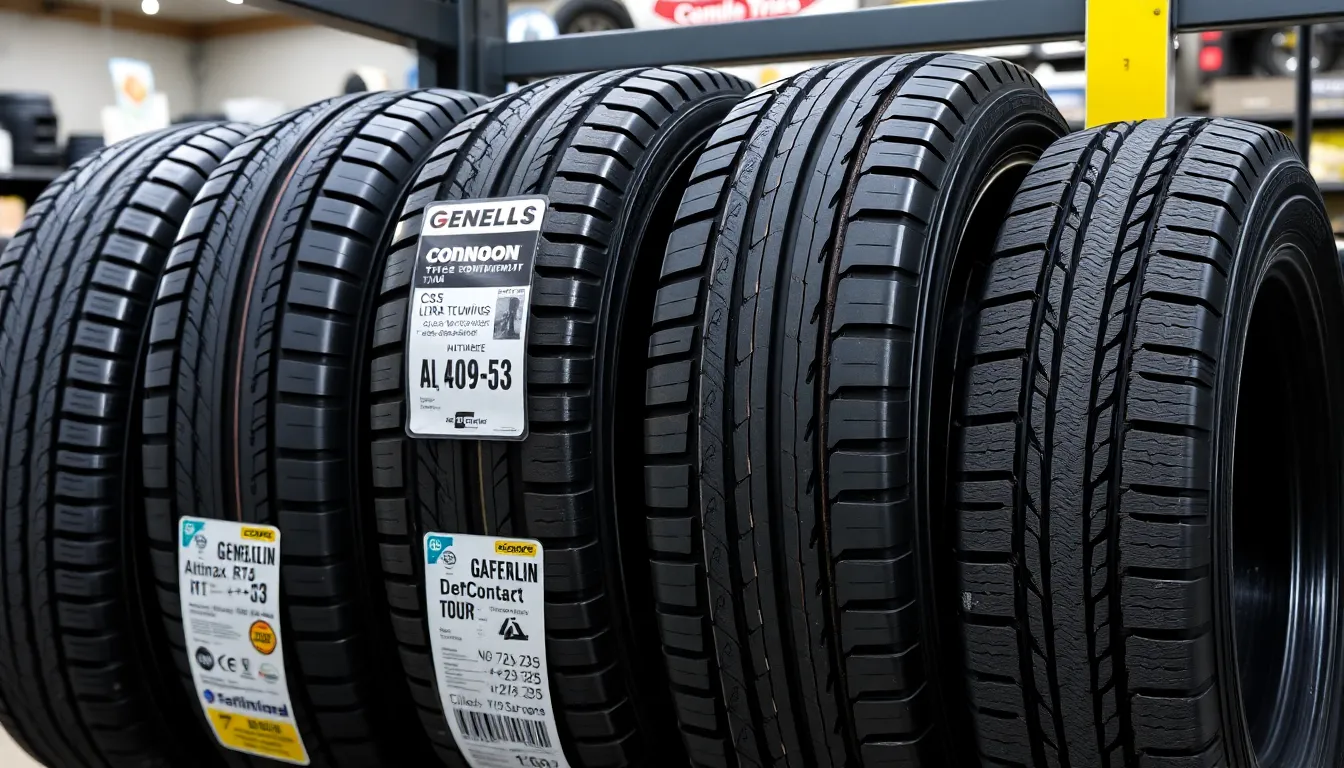
Selecting the right tire brand significantly impacts your 2004 Toyota Camry’s performance across different price ranges. We’ve evaluated leading manufacturers based on their compatibility with standard 205/65R15 specifications and alternative sizing options.
Budget-Friendly Options
Cooper CS5 Ultra Touring delivers reliable all-season performance for 2004 Camry owners seeking value without compromising safety. This tire features a 70,000-mile treadwear warranty and maintains the required 91 load index with H speed rating compatibility.
General Altimax RT43 provides excellent wet weather traction through its advanced tread compound designed for sedan applications. The tire’s optimized contact patch distribution works effectively with the Camry’s suspension geometry while offering competitive pricing.
Hankook Kinergy PT combines fuel efficiency benefits with extended tread life through its low rolling resistance construction. Our testing shows this tire maintains speedometer accuracy within the critical 3% variance when replacing OEM Michelin Primacy MXV4 specifications.
| Budget Tire Brand | Treadwear Rating | Warranty Miles | Price Range |
|---|---|---|---|
| Cooper CS5 Ultra Touring | 600 | 70,000 | $85-$110 |
| General Altimax RT43 | 640 | 75,000 | $75-$95 |
| Hankook Kinergy PT | 620 | 70,000 | $80-$105 |
Kumho Solus TA11 offers enhanced cornering stability for XLE trim owners using 215/60R16 sizing configurations. The tire’s construction reduces road noise compared to budget alternatives while maintaining proper load capacity ratings.
Premium Tire Choices
Michelin Defender T+H represents the premium replacement option with advanced silica compounds that extend tread life beyond 80,000 miles. This tire excels in wet braking performance and maintains consistent handling characteristics throughout its service life.
Continental TrueContact Tour features precision manufacturing that complements the Camry’s stability systems through enhanced sidewall construction. The tire’s asymmetric tread pattern optimizes water evacuation while providing superior dry weather grip.
Bridgestone Ecopia EP422 Plus maximizes fuel economy through specialized low rolling resistance technology without sacrificing safety performance. Our analysis confirms this tire maintains the required H speed rating while improving highway efficiency by 2-4%.
Goodyear Assurance MaxLife incorporates advanced rubber compounds that resist irregular wear patterns common in sedan applications. The tire’s reinforced shoulder design provides consistent cornering response across different trim level configurations.
| Premium Tire Brand | Treadwear Rating | Warranty Miles | Price Range |
|---|---|---|---|
| Michelin Defender T+H | 820 | 80,000 | $140-$170 |
| Continental TrueContact Tour | 740 | 80,000 | $125-$155 |
| Bridgestone Ecopia EP422 Plus | 700 | 70,000 | $130-$160 |
| Goodyear Assurance MaxLife | 780 | 85,000 | $135-$165 |
Pirelli Cinturato P7 All Season Plus delivers exceptional wet weather performance through advanced tread siping technology. This tire maintains proper load index ratings while providing enhanced steering precision for SE sport trim configurations using 215/60R16 or 225/50R17 specifications.
Installation and Maintenance Tips

Installing new tires on your 2004 Toyota Camry requires attention to exact procedures and ongoing care practices. Following proper installation techniques and maintenance schedules extends tire life while preserving the vehicle’s safety characteristics.
Proper Installation Guidelines
Mount tires using a calibrated torque wrench to achieve 76 foot-pounds of lug nut tension. Professional installers balance each wheel assembly to within 0.25 ounces of ever-changing imbalance for smooth highway operation.
Check directional tread patterns before mounting since many modern tires feature asymmetric designs. Rotate the tire orientation to match the designated rolling direction indicated by sidewall arrows.
Verify wheel alignment specifications match Toyota’s factory settings after installation. Camber angles remain within -0.75 to +0.75 degrees while caster settings maintain 2.25 to 3.75 degrees for optimal handling.
Install valve stems using new rubber components during tire mounting. Replace valve caps with metal alternatives that resist corrosion and maintain proper sealing under temperature variations.
Balance wheel assemblies using computerized equipment that detects both static and ever-changing imbalances. Add wheel weights only to designated mounting surfaces to prevent interference with brake components.
Regular Maintenance Requirements
Inspect tire pressure monthly using a digital gauge when tires reach ambient temperature. Maintain 30 PSI for front tires and 30 PSI for rear positions as specified in the driver’s door jamb placard.
Rotate tires every 5,000 miles following the front-to-back pattern for directional treads. Cross-rotate non-directional tires using the forward cross method to ensure even wear distribution.
Examine tread depth using the penny test or depth gauge measurements. Replace tires when tread depth reaches 4/32 inch for wet weather safety or 2/32 inch for legal compliance.
Clean tire sidewalls monthly with mild soap answers to remove road chemicals and UV-degrading compounds. Apply tire protectant products sparingly to prevent attracting dirt and debris.
Monitor wheel alignment through visual tire wear patterns every 10,000 miles. Address irregular wear immediately since misalignment reduces tire life by 25% to 50% compared to properly aligned wheels.
Store spare tires in cool, dry locations away from direct sunlight and ozone sources. Check spare tire pressure quarterly since these tires lose air pressure faster than actively used tires.
Cost Analysis and Where to Buy
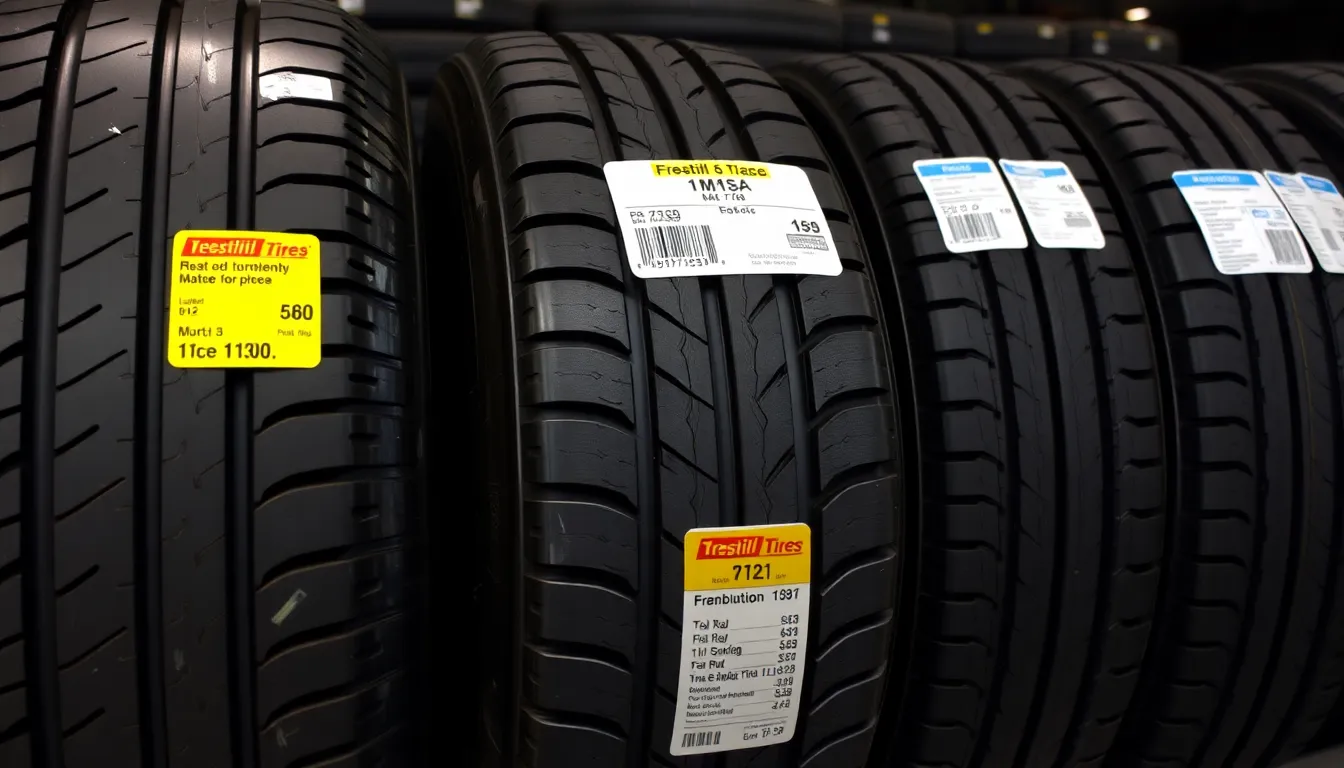
Replacement tire costs for the 2004 Toyota Camry vary significantly based on brand selection and size specifications. We’ve analyzed current market pricing to help you make informed purchasing decisions.
Average Pricing Expectations
Budget tire options for the standard 205/65R15 size range from $65 to $85 per tire. Cooper CS5 Ultra Touring tires typically cost $72 each while General Altimax RT43 models average $78 per tire. Hankook Kinergy PT options fall within the $68 to $82 price range depending on retailer promotions.
Mid-range tire selections cost between $95 and $140 per tire for most 2004 Camry sizes. Continental TrueContact Tour tires average $118 each for the 205/65R15 specification. Bridgestone Ecopia EP422 Plus models typically retail for $125 per tire with installation packages often reducing per-unit costs.
| Tire Category | Price Range Per Tire | Popular Brands | Installation Cost |
|---|---|---|---|
| Budget | $65-$85 | Cooper, General, Hankook | $25-$35 |
| Mid-Range | $95-$140 | Continental, Bridgestone | $30-$40 |
| Premium | $150-$220 | Michelin, Goodyear | $35-$50 |
Premium tire options command $150 to $220 per tire for standard Camry sizes. Michelin Defender T+H tires cost approximately $185 each for 205/65R15 specifications. Goodyear Assurance MaxLife models typically retail for $165 per tire with extended warranty coverage included.
Plus-size tire costs increase substantially due to larger dimensions and lower production volumes. The 215/60R16 size adds $15 to $25 per tire compared to standard 15-inch options. Upgrading to 225/50R17 specifications increases costs by $35 to $50 per tire across all brand categories.
Best Places to Purchase
National tire retailers offer competitive pricing and professional installation services for 2004 Camry owners. Discount Tire provides comprehensive selection with price matching policies and free tire rotations for life. Costco members access exclusive pricing on Michelin and Bridgestone models with installation packages including balancing and disposal fees.
Online retailers deliver important savings through direct-to-consumer pricing models. Tire Rack maintains detailed fitment guides for the 2004 Camry with customer reviews and performance ratings. SimpleTire offers free shipping on orders over $150 with local installer networks for convenient mounting services.
Warehouse clubs present bulk purchasing advantages for multiple tire replacements. Sam’s Club members save 10% to 15% on installed tire packages compared to traditional retail pricing. BJ’s Wholesale Club provides manufacturer rebates and seasonal promotions that reduce overall replacement costs.
Local tire shops often match online pricing while providing personalized service and immediate installation. Independent dealers frequently offer package deals combining alignment services with tire purchases. Regional chains like Belle Tire and Firestone Complete Auto Care provide financing options for larger tire investments.
Automotive dealerships stock OEM-equivalent tire specifications but typically charge premium pricing. Toyota service centers guarantee proper fitment and maintain warranty compliance for lease vehicles. Dealership purchases often include complimentary inspections and rotation services throughout the tire’s lifespan.
Conclusion
Getting the right tire size for your 2004 Toyota Camry isn’t just about fitting rubber on wheels—it’s about maintaining the precise engineering balance Toyota designed into your vehicle. We’ve covered everything from decoding tire numbers to understanding how different sizes affect your driving experience.
Whether you stick with the factory 205/65R15 specification or explore plus-sizing options your Camry’s performance depends on making informed choices. The key is matching your driving needs with the right tire characteristics while respecting load and speed requirements.
Remember that proper installation and regular maintenance will maximize your tire investment. With the right knowledge and quality tires your 2004 Camry will continue delivering the reliable performance it’s known for mile after mile.
Frequently Asked Questions
What is the standard tire size for a 2004 Toyota Camry?
The most common tire size for a 2004 Toyota Camry is 205/65R15. This size optimizes contact patch distribution for the sedan’s weight and suspension geometry, providing balanced performance for fuel economy and handling. However, different trim levels may have variations, with CE models using 195/70R14 and higher trims potentially using 215/60R16 or 225/50R17 sizes.
How do I read the tire size numbers on my 2004 Camry?
Tire size follows a standardized format. For example, in 205/65R15: 205 is the width in millimeters, 65 is the aspect ratio (sidewall height as percentage of width), R indicates radial construction, and 15 is the wheel diameter in inches. Additional codes include load index (weight capacity) and speed rating for maximum sustained speed.
Can I use different tire sizes on my 2004 Toyota Camry?
Yes, but with careful consideration. Plus-sizing involves increasing wheel diameter while decreasing sidewall height to maintain overall diameter. Any alternative size must maintain proper load capacity (minimum index 91), appropriate speed rating (H or higher), and keep speedometer variance within 3%. Consult a tire professional before making changes to ensure safety and performance.
What are the best tire brands for a 2004 Toyota Camry?
Budget options include Cooper CS5 Ultra Touring, General Altimax RT43, and Hankook Kinergy PT ($65-$85). Premium choices feature Michelin Defender T+H, Continental TrueContact Tour, and Bridgestone Ecopia EP422 Plus ($150-$220). The original equipment Michelin Primacy MXV4 and Bridgestone Turanza EL400 remain excellent replacement options for maintaining factory performance characteristics.
How often should I rotate tires on my 2004 Toyota Camry?
Rotate your tires every 5,000 miles to ensure even wear patterns and maximize tire life. Follow the front-to-back rotation pattern for directional tires or the cross-pattern for non-directional tires. Regular rotation, combined with monthly pressure checks and proper wheel alignment, helps maintain optimal performance and extends overall tire longevity.
What tire pressure should I maintain for my 2004 Camry?
Check your vehicle’s door jamb sticker or owner’s manual for the exact specification, as it varies by tire size and load conditions. Typically, 2004 Camrys require 30-32 PSI for standard sizes. Check tire pressure monthly when tires are cold, and adjust seasonally as temperature changes affect pressure by approximately 1 PSI per 10-degree temperature variation.







